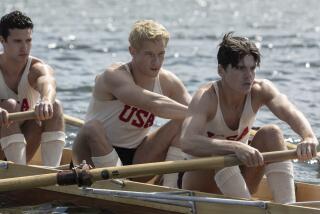It Might Soon Be Appropriate to Call Him ‘Sir Steven Redgrave’
- Share via
GAINESVILLE, Ga. — Great Britain’s Steven Redgrave became the fourth athlete to win gold medals in four successive Olympic Games on Saturday when he and partner Matthew Pinsent held off an Australian boat to win the pair without coxswain at Lake Lanier.
“What . . . am I going to do now?” he said as his two young daughters clung to him and played with his gold medal.
After the race, Redgrave repeated what he has been telling people for six months--that this was his last race. He said the same thing in Barcelona in ‘92, but most observers think he means it this time.
It’s not that he is out of options. At 34, he remains the best in the world at what he does; he and Pinsent, 25, have not been defeated since May 1992.
He has been named a Member of the Order of the British Empire, and, because of his 20-year amateur racing career, could one day be knighted.
Redgrave has trained three times a day, seven days a week with a succession of partners. He won gold medals with all of them.
But he wants some time to play with his children when he’s not exhausted from training.
Redgrave, whose wife, Ann, is the team doctor, is from a blue-collar family. He left Marlow Comprehensive School at 16, a frustrated student with dyslexia. One thing he learned in school was rowing.
He won his first gold medal at the 1984 Los Angeles Olympics in the four with coxswain. Andy Holmes, a member of the 1984 crew, was his partner in the straight four that won at Seoul in 1988.
He chose Pinsent, the son of a vicar of the Church of England and a product of Eton and Oxford, as his partner in 1990. His selection paid off handsomely in Barcelona.
The heat, semifinal and final races at Banyoles during the 1992 Games, Redgrave said, were the best of his life.
“We rowed so well in Barcelona,” he said, “it would be difficult to repeat that.”
But they dug deep for their last race together at Lake Lanier.
“Something has got to come from within,” he said. “It’s either there or not. Today it was.”
The pair knew a lot was riding on the outcome of this race.
“We’ve known for a long time of the pressure involved,” Redgrave said. “It was our one last row and you’ve got to get it right. We knew we were capable of winning. If we didn’t, it would be a big disappointment.”
As they arrived at the lake, they saw the venue flags being lowered to half staff in honor of the bombing victims. “We had to stay focused,” Redgrave said.
With Redgrave in stroke and Pinsent in bow, the opposite of their configuration in Barcelona, they flew off to lead at the start.
“It felt so easy,” Redgrave said. They diced a bit with the Australian boat of David Weightman and Robert Scott, whom they had never raced, but the British boat never faltered.
“Three hundred fifty meters from home, they looked a bit scrappy but we knew it was over by then,” Redgrave said.
Redgrave and Pinsent won in 6 minutes 20.09 seconds. The Australians rowed the 2,000 meters in 6:21.02, with France third in 6:22.15.
The other athletes to win gold at four consecutive Olympics are American discus thrower Al Oerter, Danish yachtsman Paul Elvstrom and Hungarian fencer Aladar Gerevich, who later won two more gold medals.
(BEGIN TEXT OF INFOBOX / INFOGRAPHIC)
MEDALISTS
Rowing
MEN’S DOUBLE SCULLS
Gold: Italy
Silver: Norway
Bronze: France
*
MEN’S FOUR WITHOUT COXSWAIN
Gold: Australia
Silver: France
Bronze: Britain
*
MEN’S PAIR WITHOUT COXSWAIN
Gold: Britain
Silver: Australia
Bronze: France
*
MEN’S SINGLE SCULLS
Gold: Xeno Mueller, Switzerland
Silver: Derek Porter, Canada
Bronze: Thomas Lange, Germany
*
WOMEN’S DOUBLE SCULLS
Gold: Canada
Silver: China
Bronze: Netherlands
*
WOMEN’S PAIR WITHOUT COXSWAIN
Gold: Australia
Silver: United States
Bronze: France
*
WOMEN’S SINGLE SCULLS
Gold: Yekaterina Khodotovich, Belarus
Silver: Silken Laumann, Canada
Bronze: Trine Hansen, Denmark
More to Read
Go beyond the scoreboard
Get the latest on L.A.'s teams in the daily Sports Report newsletter.
You may occasionally receive promotional content from the Los Angeles Times.




